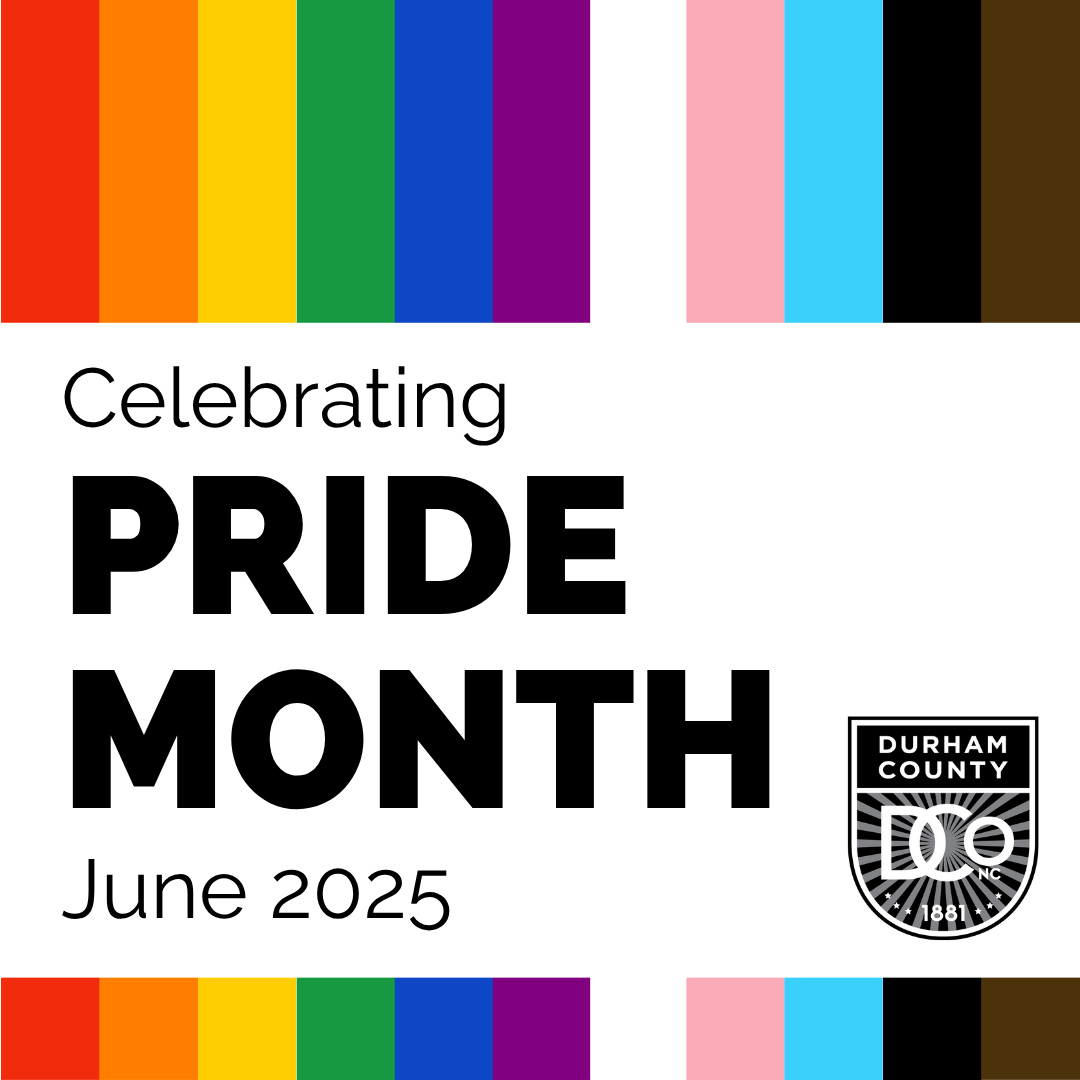June: Pride Month

Pride Month has been celebrated each June since 1970 in commemoration of the 1969 Stonewall Uprising in Manhattan, NY. While Queer rights are still challenged, progress has been made since 1969, even in North Carolina. In August 2019, the Governor issued Executive Order No. 97, which made North Carolina the first state in the South to ban state funding for conversion therapy. Governor Cooper also issued Executive Order No. 24 in October 2017, which prohibits employment discrimination in the Cooper Administration, including on the basis of sex, sexual orientation, and gender identity or expression, and requires those doing business with the state to do the same. We celebrate Pride Month to honor past advocates and heroes, to celebrate how far we have come, and to reenergize to continue the work.


Equitable Well Being Recommended Activities
Pride Fair: HHS Conference Rooms & Courtyard: 6/18, 3p – 5p, Admin II Conference Room 461
All DCo employees are invited to come celebrate your Pride at a Pride Fair co-hosted by the Office of Equitable Well-Being, and the RADIANCE Employee Resource Group. We will have food, dancing, ways to engage, community and DCo resources, partners, swag, and joy! Join us at 4pm for a group photo; wear your favorite (appropriate) Pride gear!

World Pride 2025, 50th Anniversary is being held in Washington, DC! May 17 - June 8
WorldPride DC 2025 - WorldPride Washington, DC 2025
Charlotte Pride: August 16-17th
Charlotte Pride - Welcome Home - Charlotte Pride
Raleigh Pride Parade: June 20 - 21, Fayetteville Steet
Out! Raleigh Pride | Raleigh, NC 27601
Durham Pride & Celebration: September 26-28
Pride: Durham, NC – LGBTQ Center Durham
Join DCo staff and residents in the Pride Parade! Contact equitablewell-being@dconc.gov for more details.

Connect
There are myriad local and national organizations and groups to support Queer communities and their loved ones. No individual should ever feel afraid to live their fullest and honest life, and we encourage everyone to connect with these organizations to learn how you can be a part of making that possible.

Learn
We come from different families, cultures, and communities that impact our assumptions and biases. That is normal, and ok! What matters is that we are willing to keep learning and listening. Try out a few of these resources today to learn more about Queer experiences.
- Focus on LGBTQ+ | Durham County (dconc.gov)
- PFLAG National Glossary - PFLAG
- Facts About Suicide Among LGBTQ+ Young People | The Trevor Project
| Risk Factors for LGBTQ+ Individuals | Key Protective Factors for LGBTQ+ Individuals |
| LGBTQ+ young people are more than four times as likely to attempt suicide than their peers (Johns et al., 2019; Johns et al., 2020). | LGBTQ+ young people with at least one accepting adult in their life report significantly lower rates of attempting suicide. |
| The Minority Stress Model, one of the most predominant theories used to explain mental health disparities experienced by LGBTQ+ individuals, suggests that experiences of LGBTQ+-based victimization — and the internalization of these experiences and anti-LGBTQ+ messages — can compound and produce negative mental health outcomes and increase suicide risk among LGBTQ+ individuals (Meyer, 2003). | Transgender and nonbinary young people attempt suicide less when their pronouns are respected, when they are allowed to officially change the gender marker on their legal documents, and when they have access to spaces (online, at school, and home) that affirm their gender identity. |
| The Trevor Project’s 2023 national survey found that nearly all LGBTQ+ young people of color reported higher rates of attempting suicide than their white peers in the past year. Among the more than 28,000 LGBTQ+ young people surveyed, 11% of white youth attempted suicide compared to 22% of Native/Indigenous youth, 18% of Middle Eastern/Northern African youth, 16% of Black youth, 17% of multiracial youth, 15% of Latinx youth, and 10% of Asian/Pacific Islander youth. | A 2022 peer-reviewed study by The Trevor Project researchers, published in the International Journal of Environmental Research and Public Health, found that transgender and nonbinary young people who had changed their legal documents reported significantly lower rates of attempting suicide in the past year compared to those who had not. |
| A 2020 peer-reviewed study by The Trevor Project’s researchers, published in the Journal of Adolescent Health, found that transgender and nonbinary youth who report experiencing discrimination based on their gender identity had more than double the odds of attempting suicide in the past year compared to those who did not experience discrimination based on their gender identity. | Gender-affirming medical care, such as hormone therapy, is associated with positive mental health outcomes including showing promise for reducing suicide risk. A 2021 peer-reviewed study by The Trevor Project’s researchers, published in the Journal of Adolescent Health, found that gender-affirming hormone therapy is significantly related to lower rates of depression, suicidal thoughts, and suicide attempts among transgender and nonbinary young people. |
| According to The Trevor Project’s analysis of CDC data, almost half (48%) of bi young people seriously considered attempting suicide in the past year, and 27% attempted suicide. Among gay or lesbian youth, 37% seriously considered suicide and 19% attempted. And among straight youth, 14% seriously considered suicide and 6% attempted suicide. | LGBTQ+ young people who live in a community that is accepting of LGBTQ+ people reported much lower rates of attempting suicide than those who do not. |

Do
There are endless ways to celebrate Pride Month and the Queer community!
- Filter Durham County Library events and search for LGBTQ+ related activities at Durham County Library - DCoL Events & Room Reservations - Durham County Library (libcal.com)
- Regular monthly events in Durham can be found at: Events – LGBTQ Center Durham (lgbtqcenterofdurham.org)
- Regular monthly events focused on the Queer, Latinx community in Durham can be found at: Calendar | Lila (lilanc.org)
- Support LGBTQ+ owned businesses in Durham: LGBTQIA-Owned & Operated Businesses in Durham | Discover Durham
- TV Movies:
- Podcasts

Discuss
Here are some questions to start conversations with others about PRIDE Month. For leaders, try building in time in supervisions or team meetings to prompt staff conversations about PRIDE Month. Options could include:
- Did you learn anything new about the LGBTQ+ community this month?
- Have you made any new personal or professional connections this month that can help you support LGBTQ+ communities and individuals?
- Did you learn anything new about LGBTQ+ individuals or their experiences this month?
- How did you participate in PRIDE Month?
- How can things you learned or did for PRIDE Month impact how you do your job?


